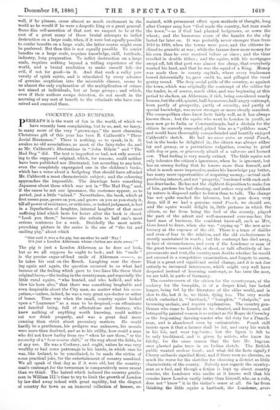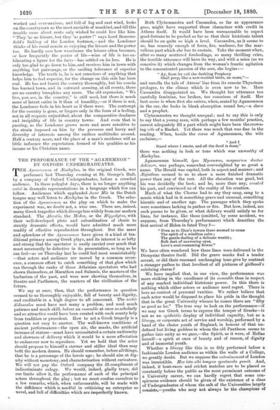COCKNEYS AND BUMPKINS.
PERHAPS it is the want of fun in the world, of which we have recently been complaining, but to us, and, we fancy, to many more of the very " grown-ups," the most charming Christmas gift of this year has been R. Caldecott's " Three Jovial Huntsmen." There is nothing, so to speak, in it. It awakes no old associations, as most of the fairy-tales do, and as Mr. Caldecott's illustrations to " John Gilpin " and " The Mad Dog " did. The text is imperfect or bad, not only accord- ing to the supposed original, which, for reasons, could neither have been published nor illustrated, but according to any text, even the completely expurgated one in the children's books, which has a verse about a hedgehog that should have afforded Mr. Caldecott a most characteristic subject ; and the colouring approaches the impossible. The drawings have something Japanese about them which was not in "The Mad Dog," and, if the cause be not our ignorance, the costumes appear, as to period, just a little "mixed." Nevertheless, the book, which at first seems poor, grows on you, and grows on you as you study it, till all power of resistance, or criticism, or indeed judgment, is lost in a liquefaction of laughter, internal laughter of that most sufficing kind which lasts for hours after the book is closed. "Look you there," becomes the refrain to half one's most serious sentences for a week. Decidedly the most mirth- provoking picture in the series is the one of "the fat and smiling pig," about which "One said it was a fat pig, but another he said Nay !
It's just a London Alderman whose clothes are stole away.' "
The pig is just a London Alderman as he does not look, but as we all suppose he ought to look ; and his " smile " is the precise sugar-of-lead smile of Alderman —, as he takes his seat on the Bench. Laughing over the draw- ing again and again, the question occurred to us what had become of the feeling which gave to two lines like these their original force,—the feeling in the countryman, and especially the little rural squire, "who hunted, and who hollo'd, and who blew his horn also," that there was something laughable and even despicable about the City man, no matter what his occu- pation,—unless, indeed, he was a very great eye-doctor or setter of bones. Time was when the small, country squire looked upon a " Lunnoner " as a man to be despised,—an effeminate and fanciful being, full of affectations and fantasy, who knew nothing of anything worth knowing, could neither eat nor drink properly, and was a great deal more cunning than strict about pecuniary matters. He could hardly be a gentleman, his pedigree was unknown, his morals were more than doubted, and as to his utility, how could a man who did not know barley from rye " when he saw them," or the necessity of a" four-course shift," or the way about the fields, be of any use. He was a Cockney, and ought, unless he was very -wealthy or had some patronage in his hands, in which case he was, like Ireland, to be conciliated, to be made the victim of some practical joke, for the entertainment of country mankind. We all speak of that day as if it were old, but the country- man's contempt for the townsman is comparatively more recent than we think. The hatred which induced the country gentle- men in William In.'s time to try to limit the growth of London by law died away indeed with great rapidity, but the disgust of country for town as an immoral collection of houses, re- mained, with permanent effect upon methods of thought, long after Cowper sang how " God made the country, but man made the town,"—as if God had planted hedgerows, or sown the wheat; and the humorous scorn of the hamlet for the city lasted far later on. It was probably never stronger than from 1810 to 1818, when the towns were poor, and the citizens in- clined to grumble at war ; while the farmer drew more money for his corn than he ever received before or since; and the vicar revelled in double tithes ; and the squire, with his mortgages swept off, felt that port was almost too cheap, that everybody wanted his land, and that he was the equal of a King. Money was made then in county capitals, where every tradesman bowed deferentially to, gave credit to, and pillaged the rural gentry round. The deep social pride of the country, as against the town, which was originally the contempt of the soldier for the trader, is, of course, much older, and was beginning at this period to slacken, an Alderman, if rich, being considered nearly human, but the odd, quaint, half-humorous, half-angry contempt, horn partly of prosperity, partly of security, and partly of special knowledge, was never stronger or more clearly manifest. The cosmopolitan class knew facts fairly well, as it has always known them ; but the squire who went to Loudon in youth, as men now go to India or Constantinople, had a disdain for the citizen he scarcely concealed, pitied him as a " pithless man," and would have thoroughly comprehended and heartily enjoyed Caldecott's sketch. He had no sacer votes or rural Punch, but in the books he delighted in, the citizen was always either fat and greasy, or a pretentious vulgarian, coining to grief with dog or gun, or grievously afraid of a valorous and horned cow. That feeling is very nearly extinct. The little squire not only tolerates the citizen's ignorance, when he is ignorant, but has an uneasy feeling that he knows more than himself, and what is much more impressive, makes his knowledge pay better, has many more opportunities of acquiring money,—actual cash producing interest, and not " property," burdened with such end- less drawbacks. He has not the slightest disposition to make fun of him, pardons his bad shooting, and unless very self-confident by nature is disposed rather to listen than to talk. The change has not quite reached the labourer, but it goes down very deep, till if we had a genuine rural Punch, we should see, and the squire would delight in, little pictures in which the citizen, so far from being the fool of the comedy, played the part of the adroit and well-mannered over-reacher, the hard man of business, the confident know-all, such as Mrs, Gore loved to draw, when she was " crying up " the new aris- tocracy at the expense of the old. There is a trace of dislike and even of fear in the relation, and the old exclusiveness is stoutly maintained in words ; but the contempt has died away, in face of circumstances, and even if the Londoner or man of the great towns cannot ride, or shoot, or talk effectively of im- provements and rent, the countryman doubts whether he would not succeed in a competitive examination, and forgets to scorn. That is a great and significant social change, and it is not ,due entirely to increased intercourse, which might very well have deepened instead of lessening contempt, as has been the case, we are told, in parts of Germany.
The counter-scorn of the citizen for the countryman, of the cockney for the bumpkin, is of a deeper kind, has lasted longer, being fed by the literature of the older world, and is slow to die, but it is, we think, dying too. The very words which embodied it, " hawbuck," " bumpkin," " clodpole," are becoming archaic, and require explanation. The country gen- tleman who came to London to be cheated, and hocussed, and betrayed by painted women is as extinct as Sir Roger de Coverley or the frog-eating dancing-master who did duty for a French- man, and is abandoned even by caricaturists. Punch still insists upon it that a farmer shall be fat, and carry his watch in his fob, and wear top-boots ; but the figure is felt to be only traditional, and is given by artists, who know its falsity, for the same reason that the late Mr. Ingram once planted palm trees in an Indian sketch. The British public wanted cou/eur locale, and what did the facts signify ? Cherry orchards signified Kent, and if there were no cherries, so much the worse for the sketcher for choosing a district so little characteristic of the county. Nobody now regards the country- man as a fool, and though a fiction is kept up about country cousins, the Londoner who smiles at it knows well that his cousins know London vastly better than himself, who, as a. rule, does not " know " it in the visitor's sense at all. So far from thinking the little .squire a hawbuck, the Londoner, aver-
worked and over-anxious, and full of fog and east wind, looks on the countryman as the most enviable of mankind, and till this trouble came about rents only wished he could live like him. " They 'as no leisure, but they 'as porter !" says Lord Beacons- field's linkboy of the London footmen,—and the Londoner thinks of his rural cousin as enjoying the leisure and the porter too. He hardly sees how wearisome the leisure often becomes, or how frequently the porter of life—wine of life is too ex- hilarating a figure for the facts—has settled on its lees. He is only too glad to go down to him, and receives him in town with anything but patronage, or the smiling tolerance of superior knowledge. The truth is, he is not conscious of anything that helps him to feel superior, for the change on this side has been real. He has not learnt the country thoroughly, but his cousin has learned town, and in outward seeming, at all events, there are no country bumpkins any more. The old expression, " We live, you see, in the country," is still used, but there is much more of latent satire in it than of humility,—or if there is not, the Londoner feels in his heart as if there were. The contempt for the country is gone, or lingers only in the form of a feeling, not in all respects unjustified, about the comparative deadness and insipidity of life in country towns. And even that is passing, as the Londoner grows more and more sensitive to the strain imposed on him by the pressure and hurry and diversity of interests among the endless multitudes around. Half a century more, and the place of a man's residence will as little influence the expectation formed of his qualities as his income or his Christian name.







































 Previous page
Previous page